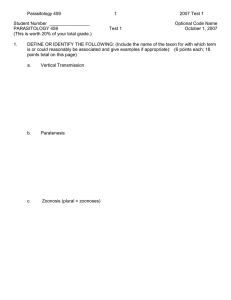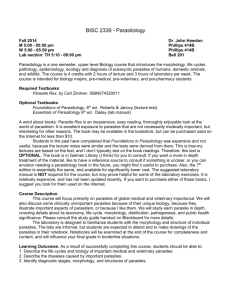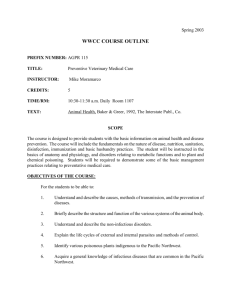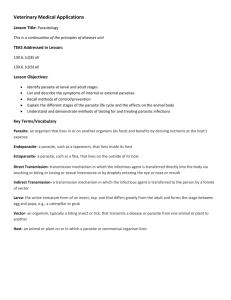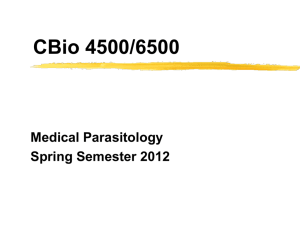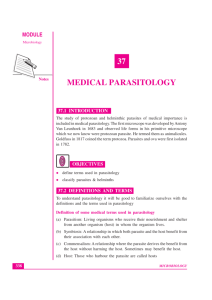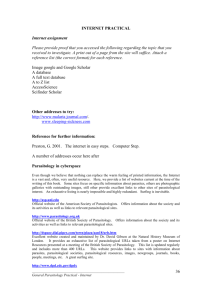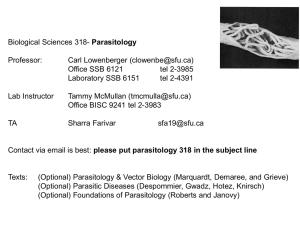Parasitology - Delgado Community College
advertisement
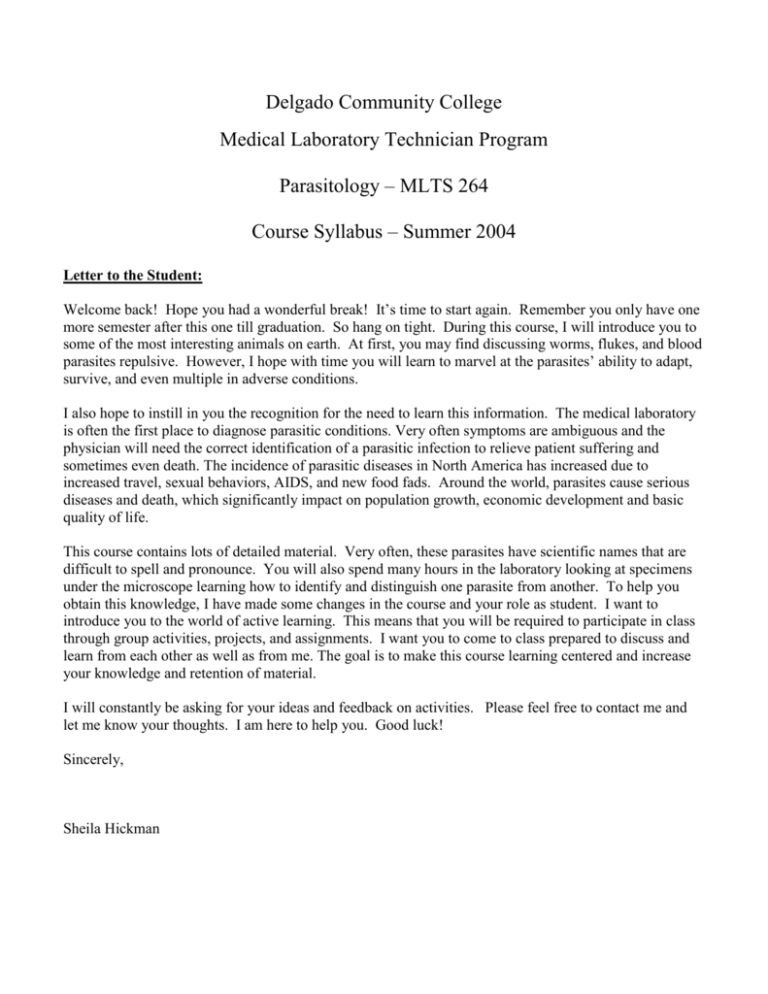
Delgado Community College Medical Laboratory Technician Program Parasitology – MLTS 264 Course Syllabus – Summer 2004 Letter to the Student: Welcome back! Hope you had a wonderful break! It’s time to start again. Remember you only have one more semester after this one till graduation. So hang on tight. During this course, I will introduce you to some of the most interesting animals on earth. At first, you may find discussing worms, flukes, and blood parasites repulsive. However, I hope with time you will learn to marvel at the parasites’ ability to adapt, survive, and even multiple in adverse conditions. I also hope to instill in you the recognition for the need to learn this information. The medical laboratory is often the first place to diagnose parasitic conditions. Very often symptoms are ambiguous and the physician will need the correct identification of a parasitic infection to relieve patient suffering and sometimes even death. The incidence of parasitic diseases in North America has increased due to increased travel, sexual behaviors, AIDS, and new food fads. Around the world, parasites cause serious diseases and death, which significantly impact on population growth, economic development and basic quality of life. This course contains lots of detailed material. Very often, these parasites have scientific names that are difficult to spell and pronounce. You will also spend many hours in the laboratory looking at specimens under the microscope learning how to identify and distinguish one parasite from another. To help you obtain this knowledge, I have made some changes in the course and your role as student. I want to introduce you to the world of active learning. This means that you will be required to participate in class through group activities, projects, and assignments. I want you to come to class prepared to discuss and learn from each other as well as from me. The goal is to make this course learning centered and increase your knowledge and retention of material. I will constantly be asking for your ideas and feedback on activities. Please feel free to contact me and let me know your thoughts. I am here to help you. Good luck! Sincerely, Sheila Hickman MLTS 264 – Parasitology Course Syllabus 1. Course Name/Section: MLTS 264 – 101 Parasitology (1-2-2) 2. Course Location Bldg. 22 Rm. 133 – Telephone #483-1859 3. Course Time Monday & Wednesday 1:00 pm - 3:00 pm 4. Instructor Sheila M. Hickman, M.Ed., MT(ASCP)SBB 5. Instructor’s Office Bldg. 4, Room 304 - Telephone # 483-4198 6. Instructor’s E-mail shickm@dcc.edu 7. Instructor’s Office Hours M 9:00 am - Noon TR 1:00 pm – 4:00 pm 8. Course Description This course begins with an overview of human parasitology and explains its significance and relevancy in today’s world. Specific parasites of medical importance are discussed. These parasites are divided into two main groups: helminthes (worms) and protozoa (unicellular microorganisms). Each parasite’s scientific and common name, life cycle, disease symptoms, and method of transmission and identification are presented. Specimen collection, preparation and identification techniques are explained. The course contains lectures, group discussion, assignments and microscopic identification exercises. Students have numerous learning tools for their use including a CD tutorial, kodachrome slides, line drawings, stained microscopic slides, and textbook color photographs. Each lecture begins with objectives, which students should use as a study guide. Students are given assigned readings in the textbook and should come prepared to class. Safety Issues & Rules: When working in the laboratory, students must adhere to all chemical & bloodborne pathogen safety rules which include wearing protective apparel, proper waste disposal, and no eating or drinking in the laboratory area. 9. Course Prerequisite: Biol 210, 212 10. Course Goal: The goal of this course is to teach the student basic entry level parasitology didactic and identification skills used in the clinical laboratory. 11. Course Objectives: Upon completion of this course, the student should be able to: A. State and spell the scientific and common name for each parasite. B. Describe the general life cycle of the Protozoans, Nematodes, Trematodes and Cestodes covered in the course . C. Identify the infective stage and its location in the body. D. Identify and draw the diagnostic stage of each parasite. E. Identify body specimen and preparation technique for proper identification of each parasite. F. List pertinent identifying characteristics for all parasites studied. G. Explain any special sample preparation or processing techniques necessary for parasite identification. H. Name disease produced by parasite and its most common symptoms I. Describe the physical, chemical and microscopic procedures used to analyze feces or other specimens in the parasitology lab. J. Identify parasites microscopically from body specimens, prepared slides or kodachromes. 12. Course Content: A. Lecture Outline Order of Topic Presentation 1 Overview of Parasitology & Fecal Analysis 2 Nematodes 3 Cestodes & Trematodes 4 Protozoa - Ameba, Flagellates, Ciliates, & Apicomplexa B. LAB OUTLINE Microscopic examination of Permanent Stained Mounts 13. Course Text: Textbook of Diagnostic Microbiology, C.R. Mahon & G. Manuselis, Jr, Saunders, 2nd ed., 2000. 14. Course Assessment – Numerous quizzes, assignments, two written tests, two practicals, and a comprehensive final written exam and practical will be given during the semester. Tests will be based on lectures, handouts, classroom discussions, text reading, and laboratory activities. Projects or homework will not be accepted if turned in late and will receive a grade of zero. Homework, quizzes and lab activities = 25% Lecture tests & lab practicals = 50% Final exam = 25% W.B. Makeup tests or quizzes will be given with the instructor's permission only. If a student has missed a quiz or test, he/she must contact the instructor immediately. A student will be allowed to take a makeup quiz or test only ONCE during this course. The highest grade assigned to a makeup quiz or test will be 92 = B. If a student misses any additional quizzes or tests he/she will receive a grade of zero. Students will not be allowed to makeup any laboratory activities or homework. Grading Scale: A = 93 - 100 B = 85 - 92 C = 77 - 84 D = 65 - 76 F = 64 and Below 15. Absences and Tardiness/Class Participation Grade Students are expected to be on time and attend each class period. If a student arrives after the start of class, he/she is considered tardy. Each student will begin the semester with a participation grade of 100 which is considered a quiz grade. If a student is absent, 5 points will be deducted (no matter what the reason might be). If a student is tardy 2½ points will be deducted (no matter what the reason might be). Points may be added to a student’s class participation grade based on involvement and participation in class. A three point bonus will be given to any student with perfect attendance from one test to the other. This will apply for tests only not quizzes or final exam. 16. Homework Assignment Grade Assignments are important learning tools. They are designed to allow the students to review and clarify important class information. Assignments may be used in class discussion. If a student does not have an assignment, he/she will not be allowed to participate in the class activity. Students are required to complete all assignments on time. If an assignment is not completed on time the student will receive a grade of zero. All assignments will be averaged and will be considered one quiz grade. Persons with Disabilities: If you have a disability and need special accommodations, please arrange to discuss your particular needs with the instructor as soon as possible. It is the general policy of Delgado Community College to assure equal opportunity for all qualified persons. Reasonable accommodation for qualified persons with disabilities will be made provided the students have self-identified with the Office of Disability Services (CPO1, 115E, 483-4890) and have provided the required documentation. Individual instructors will modify the methods, requirements, and procedures of courses and examinations appropriately to accommodate the special needs of students with disabilities, provided that the academic integrity of the course or examination is not violated, and the health and welfare of all students are safeguarded. NOTE: This syllabus is subject to change by the instructor with proper notification to the students.
